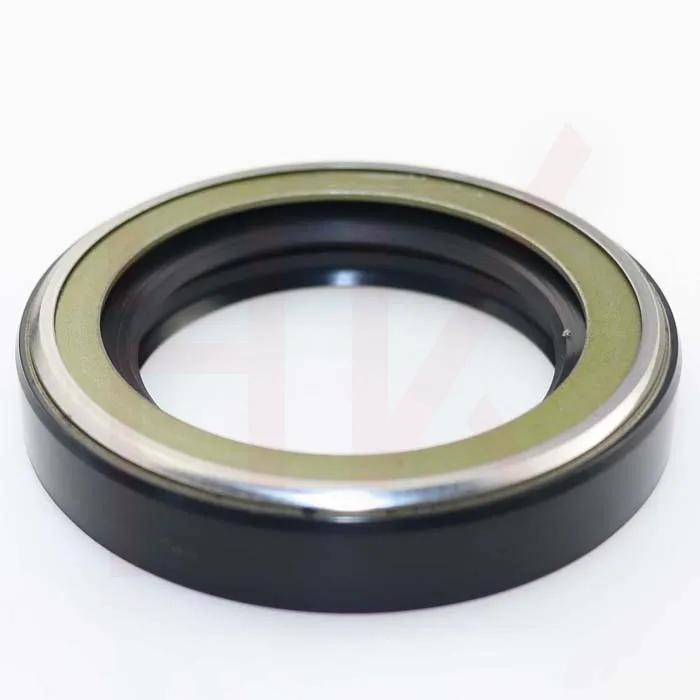dets. . 24, 2024 20:02 Back to list
Exploring the Benefits and Applications of Metal Cased Oil Seals in Industrial Machinery
Understanding Metal Cased Oil Seals
In the realm of mechanical engineering, ensuring the effective sealing of fluids is paramount to the longevity and efficiency of machinery. Among various sealing solutions, metal cased oil seals have garnered considerable attention due to their durability, performance, and versatility. This article delves into the characteristics, advantages, applications, and maintenance of metal cased oil seals.
What are Metal Cased Oil Seals?
Metal cased oil seals, often referred to simply as oil seals, are engineered components designed to prevent the leakage of lubricants and the ingress of contaminants in rotating machinery. Comprised of a flexible sealing lip bonded to a rigid metallic casing, these seals provide a robust barrier against leakage. Common materials used for the sealing lip include rubber or elastomers, while the casing is typically made from steel or aluminum.
Key Characteristics
1. Construction The unique design of metal cased oil seals features a robust outer casing that provides structural integrity and resistance to deformation. This makes them ideal for high-pressure and high-temperature applications.
2. Seal Lip The sealing lip is critical to the effectiveness of the oil seal. It is designed to create a tight seal against the shaft, accommodating slight misalignments and variations in surface finish.
3. Diversity Metal cased oil seals come in various sizes and designs to suit different applications, ranging from automotive engines to industrial machinery.
4. Temperature and Chemical Resistance Dependent on the materials used in manufacturing, metal cased oil seals can withstand a range of temperatures and resist various chemicals, enhancing their applicability in diverse environments.
Advantages of Metal Cased Oil Seals
1. Durability The metal casing adds strength and resilience, allowing these seals to withstand harsh operating conditions without significant wear.
2. Prevent Leakage The primary function of an oil seal is to prevent fluid leakage. Metal cased oil seals excel in this regard, ensuring that lubricants remain contained, thereby reducing maintenance costs and improving efficiency.
3. Extended Lifespan These seals can operate effectively over extended periods, reducing the frequency of replacement and associated downtime in machinery.
4. Versatility With a range of designs available, metal cased oil seals can be used in numerous applications, including automotive, aerospace, heavy machinery, and even home appliances.
metal cased oil seals

Applications
Metal cased oil seals are prevalent in various industries due to their reliability and performance.
- Automotive Industry They are commonly used in engines, transmissions, and differentials, where adequate lubrication is critical for optimal performance. - Industrial Machinery In factories and manufacturing plants, these seals are found in gearboxes, pumps, and hydraulic systems to protect equipment from fluid loss and contamination.
- Marine Applications In marine environments, oil seals help protect equipment from saltwater and other corrosive elements.
- Aerospace Aviation applications demand high-performance sealing solutions to withstand extreme conditions, making metal cased oil seals a suitable choice.
Maintenance and Best Practices
While metal cased oil seals are designed for durability, proper maintenance is crucial to extending their operational lifespan. Key maintenance tips include
1. Regular Inspections Routine checks for signs of wear, leakage, or damage can prevent unexpected failures and costly repairs.
2. Proper Installation Ensuring that oil seals are installed correctly is vital. Misalignment or improper fitting can lead to premature failure.
3. Choosing the Right Seal Selecting the appropriate metal cased oil seal for the specific application, considering factors such as temperature range, chemical exposure, and shaft diameter, is essential for optimal performance.
4. Monitoring Operating Conditions Keeping an eye on the operational parameters such as pressure and temperature can help in identifying potential issues before they lead to failure.
Conclusion
Metal cased oil seals are an integral part of various mechanical systems, providing essential sealing solutions that enhance the performance and longevity of machinery. With their durable construction, versatility, and effective leakage prevention capabilities, these seals play a critical role in many applications, making them indispensable in the engineering landscape. Proper maintenance and installation practices are vital to ensure these seals function effectively, safeguarding the machinery they protect. As technology advances, the development of even more efficient and durable sealing solutions can be expected, continuing to improve industry standards.
-
The Trans-formative Journey of Wheel Hub Oil Seals
NewsJun.06,2025
-
Graphene-Enhanced Oil Seals: Revolutionizing High-Pressure Oil Sealing
NewsJun.06,2025
-
Future of Hydraulic Sealing: Advanced Intelligent TCN Oil Seals
NewsJun.06,2025
-
Don’t Let a Broken TCV Oil Seal Ruin Your Day
NewsJun.06,2025
-
Bio-Inspired Dust Seals for Better Sealing Performance
NewsJun.06,2025
-
Biodegradable and Sustainable Hydraulic Seal Materials
NewsJun.06,2025
-
Top Oil Seal Solutions for Your Industrial Needs
NewsMay.22,2025
Products categories
















